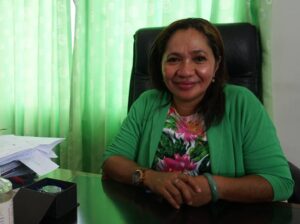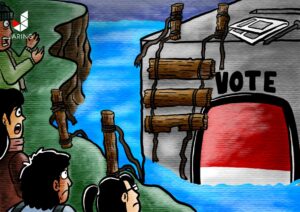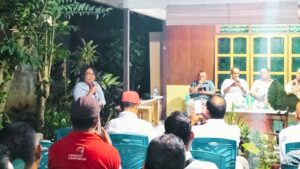During the COVID-19 pandemic, candidates of the upcoming regional elections have no other choice but to use the cyberspace in all their activities. This situation also applies to Indonesia. Yet, politicking in the cyberspace also has its downfalls. Look at Singapore for instance, where the oppositional political party has been criminalized under the country’s anti-hoax law. Meanwhile, political incumbents in Sri Lanka can just easily ban any social media accounts that they do not like, due to their strong grip of the country’s social media infrastructure.
Indonesia’s situation is no better. Just look at the draconian 2008 Electronic Information and Transaction Law, for instance, which has always been exploited by individuals to quash and silence their critics. The Southeast Asia Freedom of Expression Network (SAFEnet), for instance, has recorded about 285 attempts of criminalization against individuals using the legal product between 2008 and 2019.
The pandemic has exacerbated this trend of persecution using the draconian legal product. Since the start of the COVID-19 pandemic in March 2020, there has been about 110 suspects who have been charged with the abovementioned law. Out of the total number of cases above, about 38 are being reported by public officials like regional heads, institutional leaders, ministers and security guards.
Keeping this context in mind, Melbourne University Associate Professor Tom Gerald Daly said that the online political campaign system had made it easier for these public officials to ensnare their political rivals using the draconian law. Daly said that during an online lecture themed “Will Remote and Online Political Campaigns Guarantee Political Freedom?” on Wednesday, October 14.
Jaring.id has summarized the online lecture into the article below, edited for clarity and length.
Challenges of organizing the general elections amid the pandemic
First: some physical obstacles to reach out to voters since the COVID-19 pandemic protocols have significantly limited the number and forms of campaign activities allowed. The candidates might have some online campaigning tools but both the public members and candidates alike still have restricted access to these online campaign activities. Why is that?
This can be explained with the Second challenge: in case you haven’t noticed already, the disparity of technology infrastructure as well as access to technology across different countries are real. Not to mention the disparity of infrastructure availability and people’s access to the infrastructure among different regions among the same nation.
Third: right now during the pandemic, policymakers’ tendency not to include the public in their policymaking processes just strengthens.
Fourth: Several countries are in regression with the way that they convey information, especially through local media, as one of the consequences of the social restrictions brought by the COVID-19 pandemic.
Fifth: misinformation and disinformation just circulate more freely, with increased frequency, due to the social restrictions and uncertainties brought by the pandemic.
Sixth: it is very difficult to reach out properly to the public to inform them about the new regulations of the general elections during the pandemic situation.
Seventh: the fact that some states make stronger attempts to muzzle their critics.
Eighth: we are also concerned about the prospect of declining voter turnout due to the pandemic situation.
Of course, these challenges will play themselves out differently for different parts of the Asia Pacific region, due to different social, political and economic contexts in each part of the region in terms of unequal average income rate as well as unequal capabilities among these states to manage their democracy.
Several countries – such as South Korea, New Zealand and New Caledonia – have already demonstrated its capability of controlling the pandemic even before they conducted their elections and have successfully organized the elections. There are also countries like Sri Lanka, which have already postponed their elections twice due to the pandemic this year. Let us look at the success stories first.
South Korea’s key to successful elections during the pandemic
South Korea is one of those countries to pioneer organizing the general elections amid a paucity of pandemic-time elections best practices. Not only South Korea has been successful in organizing free and fair elections, it has also demonstrated a high level of innovations in terms of managing the elections during the pandemic, as well as concluding its elections with a high turnout.
First: South Korea’s approach to elections management during the pandemic has always focused on building public trust that the organizers are protecting and prioritizing the voters’ safety.
Second: the country is fairly transparent about the entire process, by giving various online information sources to guide candidates and voters alike.
Third: the country has already come up with clear-cut regulations on what can and cannot be done by candidates during their campaign activities.
Fourth: candidates have been innovating with various online campaigns using various videos, applications and social media platforms.
Fifth: the early-bird voting system has greatly benefited South Korea, helping to leverage the number of citizens using their voting rights.
Finally: the country has a clear and effective health safety regulations during the voting day.
Besides having successfully flattened their COVID-19 infection curve before the election day, South Korea has also been greatly benefited by the high quality of the country’s democracy, governmental capacity, a tech-savvy governance apparatus as well as high internet penetration (about 95 percent of the total South Korea population has already accessed the internet).
Mongolia is yet another country which has successfully organized the general elections during the pandemic time. The country has been able to overcome the pandemic, bringing the death rate down to zero. They duplicate the campaign practices done in South Korea. Although Mongolia’s internet penetration rate stands only at 20 percent, yet the country has been able to boost the elections turnout to as high as 73 percent.
The government and technology
You cannot just haphazardly apply South Korea’s strategies, such as shifting all face-to-face meetings to online and in-application ones, in different countries. You have to take into account the political contexts of different countries whereby authorities have erased the oppositional presence in practically the open information medium by blocking the website of political oppositions, for instance. This has become a highly serious problem. The more political activities are conducted online, the more the government needs to address these attempts of censorship.
We have already seen how countries with poor history of democracy such as Hungary have done this kind of censorship under the guise of improving its information system. The Hungarian government has already built a hoax verification site, yet the only thing they do with the site is to attack the opposition and brand everything they say as a lie. You can easily see how this kind of tactic can easily be used during the elections period, considering just how concentrated the government’s power is. We have seen this happening in Sri Lanka and this is a serious problem.
Pandemics and authoritarianism
During the pandemic, we’ve also witnessed that negative trends in politics and democracy have further been exacerbated. The pandemic is not the cause; it has simply douse gasoline on an open flame. For instance, we have always seen how oppositional voices have always been repressed; the pandemic has simply accelerated the already ongoing problem, making the repression even stronger and clearer.
I think it’s fair to say that some countries have turned into opportunistic autocratic type of government and some governments are exploiting crisis situations we are facing right now to perpetuate negative situations. If you have a strong history of political opposition using online technology, of course the backlash will be even more terrible. South Korea, meanwhile, has a greater acceptance of open source and open government platforms, no different from Taiwan. This openness will be greatly beneficial during the pandemic by boosting positive trends among them.
Online campaigns
The Mongolia case merits further investigation: is it true that social media has impacted elections turnout rate in the country? We have indeed seen various information circulating on Twitter about the issue but that alone is not enough. I’m always worried we’re seeing technology adoption way too positively, having too much good faith in it, turning a blind eye to what the reality looks like.
Aside from issues of political freedom, we need to also touch upon the issue of equality. Some people can easily access the internet, some others cannot. Some people have great access to digitized public forum, some others don’t. This issue has become more complicated, taking low access to internet connection into account.
I have a mixed feeling about online campaigns. South Korea is the best practice and yes, we hope to replicate that. Currently, many people still perceive online campaigns positively, yet we still need to look at the issue openly and in a balanced way, also taking into account some negative possibilities that can come out of it.
The issue will not disappear by its own, even after the pandemic has been over. Online campaigns will always bring various kinds of negative impacts. We can only hope that the potential for violent consequences will decrease along with declining physical contacts. Yet at the same time, the World Health Organization has also warned us about what it refers to as “infodemics” – the circulation of hoaxes, rumors as well as the scapegoating of various minority groups for the pandemic as seen in India or the rise of hate speech against some groups which typically increase in the run up to the elections – as early as in April 2020, as a potential risk which can happen alongside the pandemic.
Regulating social media
We know that social media platforms are highly resistant to the idea of regulating speeches in their platforms. Regulatory issues become highly problematic here, especially when it is placed within the context of the government’s attempts to suppress freedom of expression. Look at Brazil for instance: it has just signed the Hoax/Fake News Law, which has tried to hold social media platforms accountable for what is being disseminated through their platforms. They need to report violations, alter their communications strategy – and there are quite a few people worrying that this is nothing but yet another attempt by the state to censor its citizens.
So, here we have a catch-22 situation: giant tech companies are reluctant at any attempts to regulate them, when regulation is necessary. Yet, overregulation is also feared to turn into repression if not be used cautiously.
Lessons from the pandemic
First: the normalization of technological surveillance to track individuals down for commercial and political purposes have created consequences on the micro level: such as creating echo chambers and information fragmentation which gives rise to alternative realities: this is the future we are seeing.
Second: what we see in South Korea teaches us that technologies are neutral: they are simply a tool which depends on how and to what end we are using them. There are positive ways of using technology such as seen in Taiwan with its abundance of crowdsourcing, open source and information decentralization technologies. We can push this positive trend further within the context of the elections, such as by creating online newsletters. Sharing information in a way which is far from the executive power concentration will be a new frontier in the future.
Technology and political participation
We still measure political participation in narrow ways: one’s belonging to a political party, voter turnout and the number of votes gained. The types of political participation, meanwhile, have diversified. Change.org for instance has conducted a survey indicating that more and more people have signed online petitions, up to 81 percent during the pandemic.
Yet, just a few years ago there has been this popular view that the public has lessened its political participation, moving toward a-political society. I think what we can do instead is to broaden our definition of public participation to be able to see the picture clearly.
Yet, we need to return to traditional campaign forms. We have realized more than ever during this pandemic that we are social animals who need social support in a physical context. We need to commune in a place physically, getting a sense of human community which can neither be simplified nor digitized. Online campaigns are useful, yes, but we need to perceive online tools as merely substitutes for irreplacable traditional ones.







